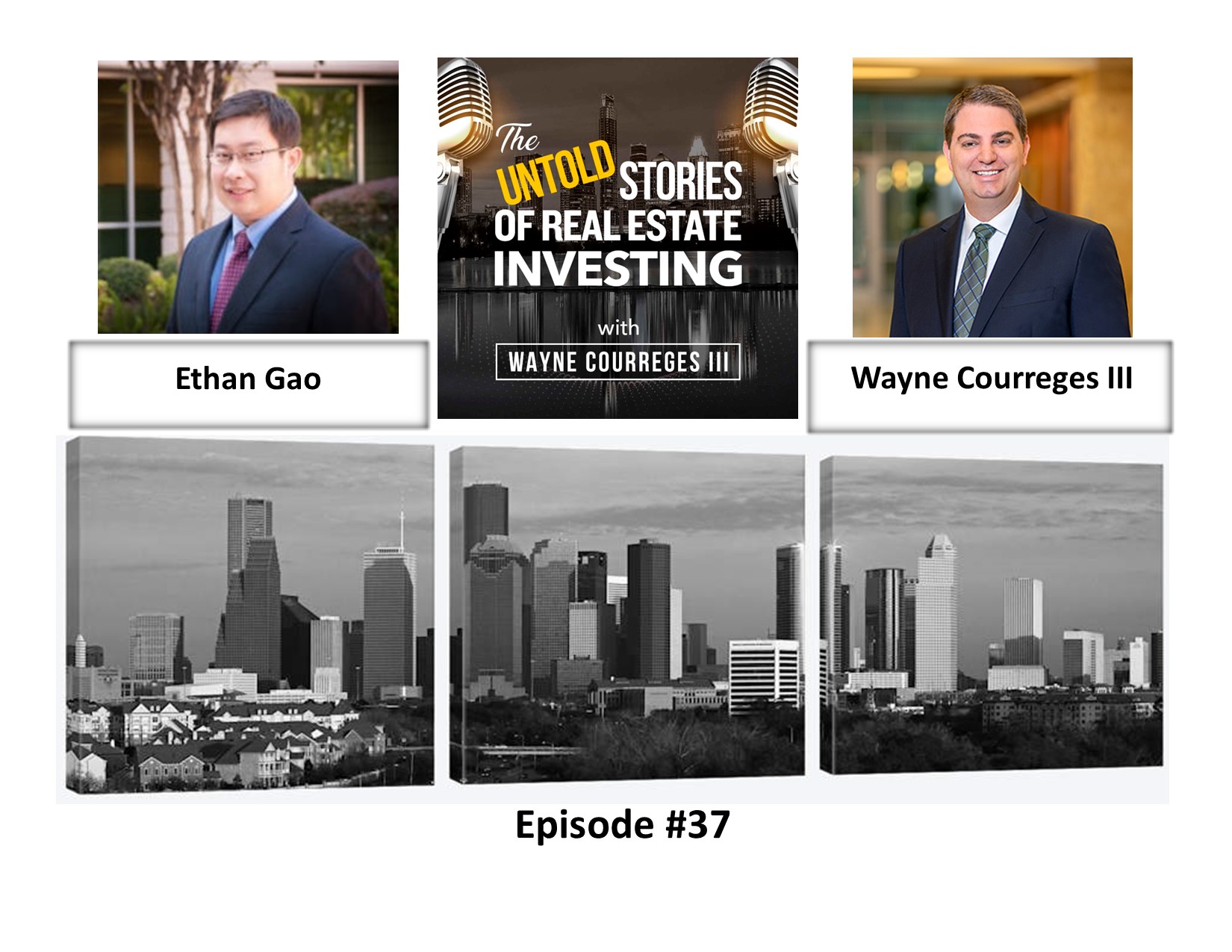
In today’s episode of the Untold Stories of Real Estate Investing, host Wayne Courreges III talks to Ethan Gao. Ethan is is an attorney, key principal, and general partner. He has made over 300 private loans secured by real estate, invested in over 100 single-family “fix and flips.” Ethan is also a general partner on multiple commercial and multi-family projects totaling over 900 units. His primary role on deals is loan guarantor, key principal, or gap funder. Both personally and through his private equity fund Good Bull Investments LP and Good Bull Lending, LLC, Ethan has invested in commercial properties totaling over $25 million.
Ethan graduated from Cornell University with a BA in Economics, in 2003 at the age of 19. Afterward, he attended Columbia Law, beginning at age 19 and graduating at 22. He worked on Wall Street in financial institutions focusing on billion-dollar mergers and acquisitions for several years before transitioning to being a professional investor and entrepreneur in 2016. Ethan now lives in Houston, TX with his wife, whom he met on the first day of class at Cornell in 2000, and their five children.
Topics on Today’s Episode:
- How and why Ethan went from successful Wall Street lawyer to Houston real estate investor. How different life stages change priorities and perspectives.
- The top reasons why staying on the passive side of real estate investment works for attorneys. Ethan took the approach of finding operators to lend money to or financially back, to limit his time commitments while working demanding corporate jobs.
- Perspectives on single-family distress sales and “fix and flip” and why he prefers working as a loan guarantor.
- Leveraging networking to meet personal goals. He went to meetings and took cards, emailed them back, and was able to form valuable connections. A less relevant person often refers you to someone who is a perfect fit for what you’re trying to do.
- The current market environment has caused deal flow to slow down dramatically for single-family “fix and flip” transactions. Negotiating all the services and aspects relating to purchasing a property is valuable-mortgage fees, inspection fees, etc. can improve the terms of the transaction.
- How the financial system works in multi-family deals and the role of the key principal/loan guarantor. Liquid funds and net worth requirements for multi-family lending.
- How to vet whether sponsors and managing principals are reliable and will execute the business plan. Ethan believes in underwriting the people before underwriting the deal, to mitigate risk. How will this person behave in a tough situation?
- Discuss the difference between recourse and non-recourse loans. If the loan value is greater than the sale value, a full recourse loan will have to be repaid in full to the bank. A non-recourse loan will be fully evaluated by the bank, and if the lower value was outside the operators’ control, and there was no fraud, etc., the bank would now own the property then everyone moves forward. The operator would struggle to be approved for future loans but would not have to repay the balance of the loan. Recourse loans may be needed for certain asset classes, and often offer better interest rates.
- If the key principal is signing off on multiple loans, does it eventually trigger a red flag from the bank, Fannie Mae, or Freddie Mac? Anecdotally, results vary.
- What are additional requirements to sign off for government loans from Fannie Mae or Freddie Mac? These loans have more stringent requirements than other loan sources.
- Ethan’s perspective on the gap funding process and why it is necessary in syndication deals. This is a demanding, speedy process meant to help meet deadlines, such as in the case of 1031 exchanges.
- Gap funding is valuable for Ethan because original funds plus interest are returned quickly, in exchange for a percentage of general partnership that will yield a payout at the sale of the asset in 5-7 years.
- In order to consider providing gap funding, Ethan prefers 80% of funds needed to already be raised, as well as other criteria. Creative collateral options are available in cases of low liquidity available from the syndicator.
- What other asset classes does Ethan Gao extending gap funding for? Due to his network, Ethan’s investments are primarily in multi-family real estate syndications, but there are a few outliers. He seeks out opportunities to lend that are short-term loans, where the borrower is motivated to pay high rates and their repayment strategy makes sense. This is a tool to move the needle from no to yes, for a transaction.
- Ethan is proudest of his kids and in support of his wife as a “professional mother.”
Links and Resources:
Ethan Gao
Good Bull Investments – Private Equity, Texas Style
CREI Partners
https://www.passiveinvestorcoaching.com


 Subscribe to our newsletter so you never miss out on new investment opportunities, podcasts, blogs, news and events.
Subscribe to our newsletter so you never miss out on new investment opportunities, podcasts, blogs, news and events.
Leave a Reply